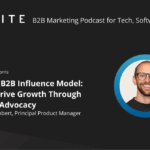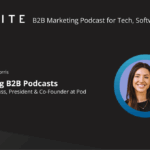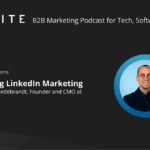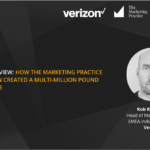At FINITE, we ask the questions that other B2B marketers are curious to know, yet are sometimes afraid to ask within their peer group. We talk automation, pain-points, data and when to focus on which aspect of your marketing mix, plus many such insights. Every month we aim to ask a Senior Marketer in the B2B Technology space the questions you may have been asking yourself. Today, we talk to Jonathan Ross, Head of Marketing at Beauhurst, a unique proposition, in that it is a searchable, comprehensive database of the UK’s top startups and scaleups. If you are looking for information on a fast-growing, ambitious company, Beauhurst will have that information.
Hi Jonathan, how did you get into marketing?
I did a music degree and once I realised I wasn’t good enough to be a professional musician, I liked the sound of marketing! I think the combination of creativity and critical thinking really appealed. I was lucky enough to get a marketing internship in the arts, and that set me up with the basic tools to begin a marketing career.
What do you see as being the major opportunity in the marketplace for Beauhurst?
We’re increasingly seeing larger corporates realise that they need better ways to monitor and engage with fast-growing companies (particularly disruptive ones), but they don’t have any information on them beyond basic Google searches and free tools. Given our niche, we’re very well placed to help them.
From a more tactical perspective, we can also use our own product to develop data-driven content that generates a good amount of inbound interest from prospects, journalists and others.
What would you say your biggest marketing challenge is?
Having a unique proposition or niche is great, but also challenging, particularly with quite a wide-ranging product. Trying to explain clearly what our product does when it has so many potential use cases, markets and industries can be tough, particularly in very short copy or creative.
CRM, segmentation and automation is also a challenge – choosing whether to segment users and prospects by industry, use case or demographics is difficult and finding ways to ensure good data quality is a constant challenge to using email automation effectively.
Which channels perform best for you currently?
Like many B2B businesses, we use a combination of paid and organic channels. In terms of paid, we have most measurable ROI and volume through search campaigns on Google Ads. A lot of our inbound interest (and conversions) derives from organic search, but this is assisted by our other activity, eg paid search, paid social and broader PR and events outreach.
Do you see social media forming a part of the B2B customer journey?
Yes, hugely. I once went to a talk given by a CMO at a major IT services company who said social media would never be a key channel for large-scale B2B marketing and sales. Complete rubbish! If you sell your product or service to people, chances are that they will be on social media too. We have had many sales qualified leads and wins from social channels. The difficulty is developing messages for those people that will be relevant to them at the right time and on the right channel. I think understanding the different stages of the marketing funnel and developing content that is appropriate to each stage is important, particularly when trying to reach new audiences on social.
Unsurprisingly for a business like ours, we see LinkedIn as having huge potential to drive brand awareness and ultimately, conversions. We are also experimenting with Facebook ads, but the process of testing and experimentation is very time intensive.
For most companies, SEO is vital to their existence. Is SEO an important channel for Beauhurst?
We monitor our search performance and take steps to optimise it. Even with tools like Moz, it can be difficult to know both what drives value and where the opportunities lie. We do find that understanding SEO gives us some very useful tactical opportunities to rank highly for very specialised long tail terms that can drive highly engaged traffic. Doing the same for more generic, high traffic (and competitive) queries is very difficult to do though! Attribution is always a problem though – understanding how much of your organic search traffic (for example, brand searches) is being pushed by social or paid activity is something we try to understand and influence our plans.
Have you experimented with retargeting, and how has it worked for you?
Yes, we use retargeting across all our paid channels and they drive a small but significant proportion of our inbound conversions, but also very useful at keeping our brand top of mind for prospects lower in the funnel. We find that sharing a mix of higher (blogs, reports) and lower funnel (case studies, product-focused) content works well.
Voice search seems to be a hot topic at the moment – how do you see it forming a part of your marketing?
To be honest, we haven’t really looked at this as a standalone topic. Thinking about SEO in a question/answer format plays into the general theme though – so we make sure some of our content is optimised to rank for question-based searches.
Has creativity in marketing been lost and replaced by data?
Fundamentally, no, as I think they aren’t mutually exclusive. I think that marketing is still the attempt to show the right message to the right person at the right time. To do that, you need a combination of interesting messages (which involve good creative work) and knowledge of your target personas and the right targeting methods (which need good data and analysis). Anyone who has worked on developing and optimising ads and landing pages knows that distilling marketing messages into these formats requires real creative thinking, and targeting, testing and improving needs a shedload of data and sharp analysis.
The tools and technology in the marketing sector change quickly, how do you keep up?
It’s difficult to keep up to date with changes to tools and new techniques. I follow a few interesting marketers and brands on LinkedIn and Twitter, and I find guides, case studies and notifications from key software providers like Google Ads, Facebook Business and other more specialist tools like Moz and Campaign Monitor very helpful. I’d love to find a place where this was all combined, though.
What’s your favourite marketing technology or tool?
A very difficult question as I don’t think I have one! I find that there are a lot of tools that do certain core things very well and other things not so well. A classic example of this is HubSpot, which has a huge range of features and can be incredibly powerful, but some elements, for example, email, feel a bit patchy – at least when compared to more specialist tools like MailChimp and Campaign Monitor.
I’m a big fan of Intercom as a communication tool, it’s given us an extra boost to communicate at the right time with our prospects on landing pages, and drive traffic to targeted content based on data. HubSpot offers a chat tool too and it will be interesting to see how the two stack up, particularly when combining lots of powerful HubSpot CRM data to make an interaction more targeted (eg based on funnel stage, industry etc).
In terms of technology, I think elements of retargeting are really interesting. Google’s RLSA feature is a powerful way of segmenting lower funnel contacts for specific search ads and is well worth a look if you have enough traffic to support it, and ideally, with importable contact data straight from your CRM.
What does the future hold for Beauhurst in the short to medium term?
Our current focus is on growing our customer base in our core markets and supporting that through our organic and paid channels. In the medium term, we’ll look at ways to better integrate our product, content and CRM, and drive more engagement through content and automation.
We’re also about to launch a really interesting new feature to our product, so watch this space!
I once went to a talk given by a CMO at a major IT services company who said social media would never be a key channel for large-scale B2B marketing and sales. Complete rubbish!
What’s your proudest marketing moment?
Very difficult to pick a proudest single moment but seeing any marketing activity translate into engagement and sales is always really satisfying. I’ve always enjoyed working on really eye-catching and interesting content. Those campaigns that result in great engagement, sales and press coverage make all of us proud.
Lastly, a cliché, but I always find it really rewarding seeing team members (particularly new hires) develop expertise and grow their careers.










